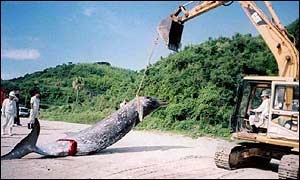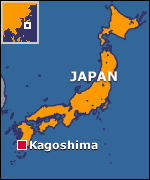|
26th December 2002,
Scientists buried the whale without realising what it was
A whale that beached itself in Japan this summer has turned out to be the most complete specimen ever seen of a rare species, scientists have said.
The creature, which died soon after coming ashore in July, has been identified as a Longman's beaked whale.
“We buried it without knowing exactly what it
was. It was amazing that we found such a rare
whale," Nobutaka Kubo, a marine researcher at
Kagoshima City Aquarium, told the Associated
Press news agency.
Japanese scientists realised soon after the animal
was buried that it was unlike other whales known
in Japanese waters and dug it up on 3 August to
perform tests.
First complete example
They announced on Wednesday that the 6.5-metre
(21-foot) female was the first whole adult specimen
ever found.
"We did some follow-up on the whale because we
buried it without knowing exactly what it was,"
Dr Kubo said.
Scientists examined the whale's skeleton, stomach contents and DNA.
They ruled out the possibility that it was one of seven related species based on the shape of its body, head and teeth, concluding that it must be a Longman's.
That species - Indopacetus pacificus - is known from two skull samples, one found in 1882 and the other in 1968, and from other fragmentary remains found in South Africa, the Maldives and Kenya.
In 1926, HA Longman described the original find as a new species.
South African specimen
The Japanese report mentions a whale found beached in South Africa in the summer of 2002, which they say is probably not a Longman's.
"As far as we could see from the images provided the [South African specimen] is very similar to Cuvier's beaked whale. It is very unlikely that it was a Longman's beaked whale," the report said.
When the South African specimen was found in August, whale expert Vic Cockcroft said the discovery of a Longman's beaked whale was extremely important.
"It's amazingly valuable, simply because we know absolutely nothing about the animals because they have only been seen two or three times alive," he said.
"We don't know the maximum size, we don't know where they feed or what they feed on. I mean we know absolutely nothing about them, where they occur even," Dr Cockcroft said.
Diet of squid
As its name implies, it has a long, beak-like mouth, and is believed to normally inhabit waters far from shore.
From the shape of their teeth, scientists believe the whales feed on squid.
Experts do not know if they are endangered or merely seen rarely because they live far from humans in the Indian and Pacific Oceans.
The skeleton of the Japanese specimen will be displayed at the Kagoshima City Aquarium.
Top
|

